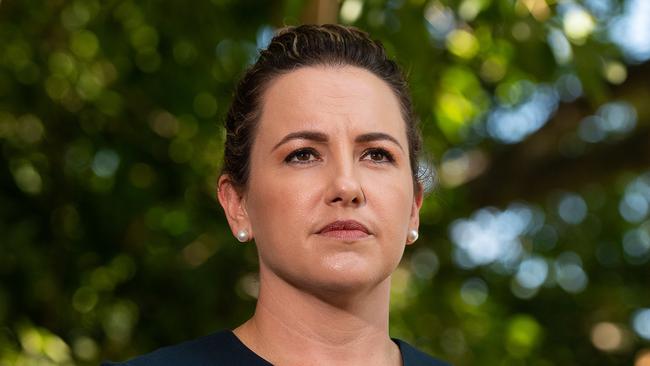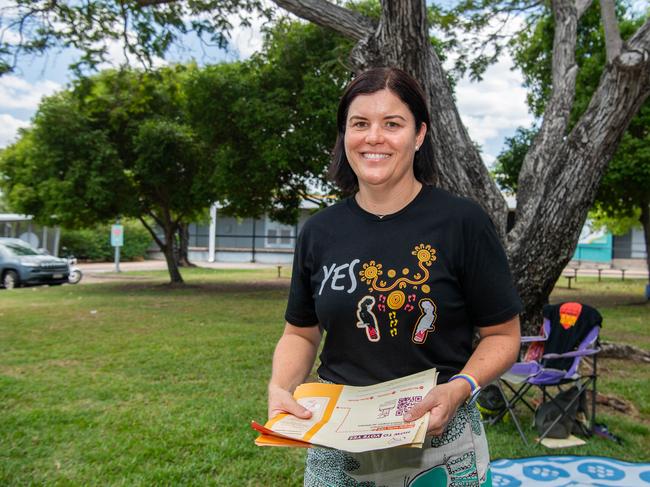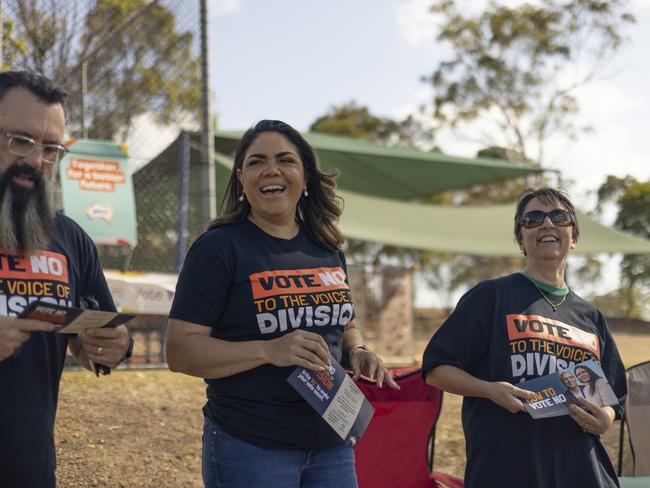How Territory politicians voted on the Indigenous Voice to Parliament referendum day
Opposition Leader Lia Finocchiaro says the Territory’s overall opposition to the Voice reflects a ‘broader message of being ignored’. Here’s how she’s calling for change.
Northern Territory
Don't miss out on the headlines from Northern Territory. Followed categories will be added to My News.
Before the final ballot could be cast in the Northern Territory, Australia had overwhelmingly said No to the Voice to Parliament.
Where hope shone during the day, it dramatically turned once counting began – before 6pm local time. It became clear the national vote, as well as the Territory’s was against the Voice.
Early results just after 7pm put Lingiari at more than 63 per cent, and Solomon 64 per cent, against the constitutional change.
By Sunday afternoon the Lingiari’s No majority dipped to 56 per cent as more remote votes were counted while Solomon’s result remained similar.
Opposition Leader Lia Finocchiaro, who revealed in August she would vote No but did not campaign on it, said on Sunday she respected the outcome.

“The result shows people did not need Canberra’s Voice, they need Labor to listen to their concerns and I have no doubt the Territory’s No Vote reflects a broader message of being ignored,” she said.
“I want to thank the Country Liberal Party and our CLP Senator Jacinta Nampijinpa Price, who stood up for all Territorians during this debate.
“The CLP is committed to returning local control through changes to local government, so that Aboriginal people have a direct say on what they need in their communities.
“That’s what they are telling us they want and we are listening.
“The Fyles government should now work with the CLP and focus on better outcomes for Aboriginal Territorians not politicking and blame shifting.”
It was an overwhelming result, one that shattered the hopes of Chief Minister Natasha Fyles who, during the day at a polling station in her local Nightcliff electorate, remained positive for the Yes camp.
“I’m disappointed with the result but completely respect the decision,” she said on Saturday.
“Here in the Territory, we’ll continue listening to our communities and doing what we can to build a better future for all our people.
“We will continue with local decision making, we’ll continue to invest in housing, education, and health services, and we’ll keep working to create more jobs on country.
“The Territory Labor government has always backed the bush and Aboriginal Territorians, and that won’t change.”

Solomon MP Luke Gosling said the referendum’s defeat did not “take away the need to listen to First Nations people”.
“The Territory and Australia has voted – and they have not chosen the Voice,” he said.
“But that does not take away the need to listen to our First Nations people, to acknowledge the nation’s history and the need to stop doing things for or to Aboriginal people and to start working with them.
“This should have been a bipartisan issue – this was a moment to seize – to build a better future for all Australians.
“But we have had the vote – and the vote was No.
“Let’s be clear though – this was a rejection of this way forward – not of Aboriginal people, or recognition – but just of this way forward.”

Territorians – like their ACT cousins – are institutionally disenfranchised because the votes are only included in the national count but not the state count, which require the support of a majority of jurisdictions.
Mr Gosling said the disadvantage would be addressed if the Territory was a state.
“We should be a state anyway so hopefully that can progress in the near future and then we can be automatically included in the state count,” he said.
“This is an example where something that’s very important to the future of our nation we haven’t got a full say in and we definitely want to see that in the future.”
Labor senator Malarndirri McCarthy was out of the Territory on voting day, campaigning from the inner-Sydney suburb of Redfern, synonymous with Indigenous activism and self-determination.




